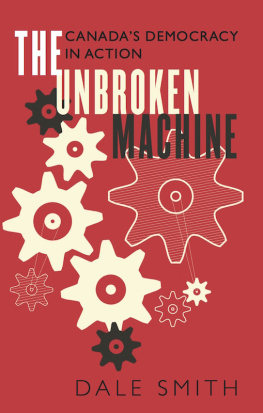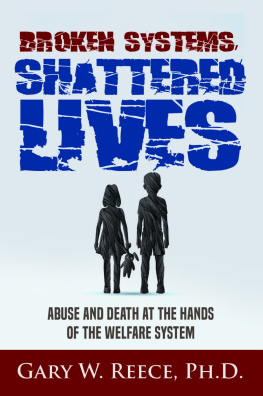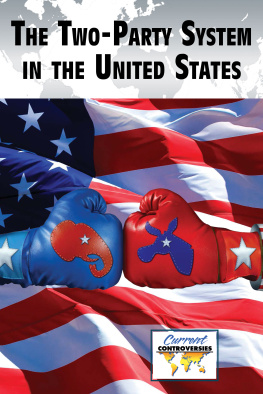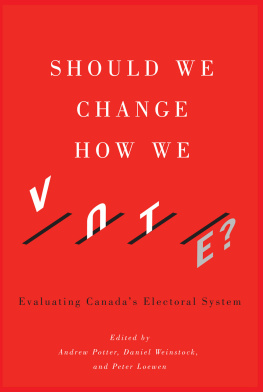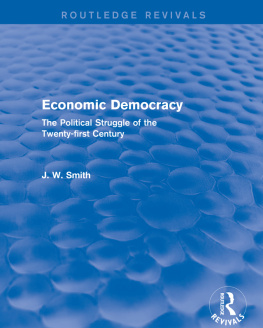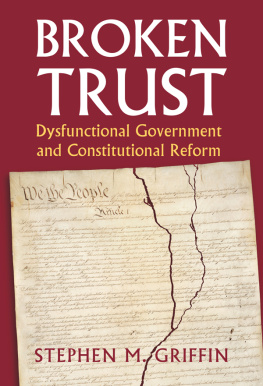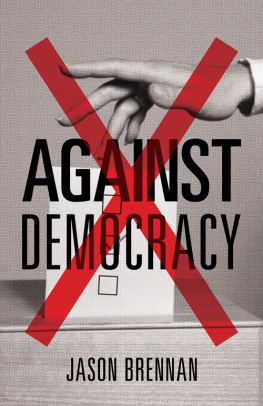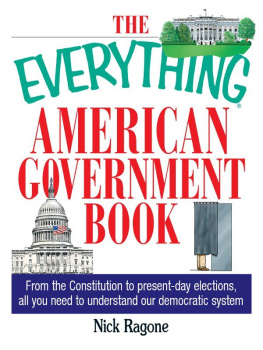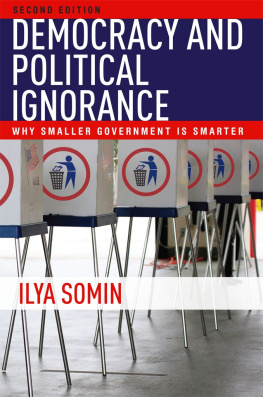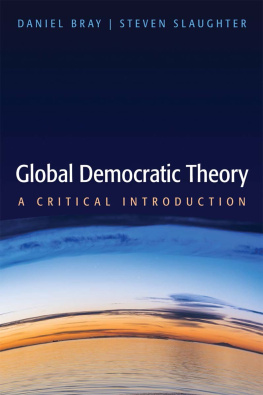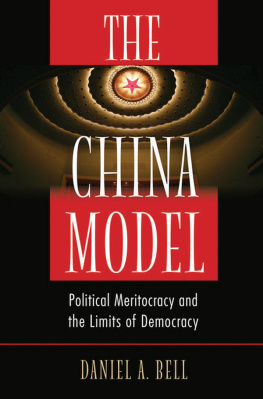Foreword
The fact that youre reading this means that you have decided to at least try entering the world of electoral reform. The fact that you could read this sentence means your eyes havent glazed over yet. Good. Keep going. Its worth it.
We are told that there is a terrible problem with our electoral system. It seems to be electing governments that dont represent the will of the voters, or at least dont represent the many views of the voters. A system that crudely crushes political dreams and ensures the hegemony of the established power grid. Apparently, following in the footsteps of Dante on the road to Hell, the only valid sign outside a polling station, should read Abandon hope all ye who enter here. In short, the way we practice democracy is an absolute mess.
Or so we are told.
Fortunately, there are many solutions, and a virtual army of policy warriors ready to slay the dragon of democratic injustice by dispatching not only the current system, but anyone not adhering to the one true alternative. Just which one that is depends on which army you join, and its a crowded field.
Heres a simple guide: The smaller parties, like the NDP and the Greens, prefer Proportional Representation, because its the one system that could give them a secure and influential position in Parliament, despite their limited appeal. The Liberals want ranked ballots, because as a party of the centre, they will likely be the second choice of both those on the right and the left, thus ensuring political dominance for generations. The Conservatives dont want any change, as the current system favours them every decade or so, which is why they are demanding a referendum. Referendums tend to kill change.
Proponents of the various systems will no doubt quibble with some of this. Thats fine. In the electoral reform world, simplicity is eschewed and complexity celebrated. Listen to any of the public consultations.
But hang on. Push the pause button.
What if the electoral reformers have got it all wrong? What if this is not a problem of fairness but one of understanding? What if the real issue is a problem of indifference and ignorance, rather than competing systems and outcomes? Is electoral reform then just a solution in search of a problem, while the real issue is the steady erosion of the bonds between citizen and institution? Could be.
Take a look at just two of the seismic political events of the past few years: Brexit and Donald Trump. They have both been seen, and rightly so, as expressions of anger and frustration against the ruling order. In Britain, the fuel for the revolutionary fire was the massive tide of human migration all too near to Englands green and pleasant land the hundreds of thousands people from the war-torn countries of the Middle East and Africa streaming into Europe anyway they could. Their journey headed ever northward, through the Balkans and into the heartland. Tens of thousands tried to get through to England, stopped temporarily in Calais at an encampment known simply as The jungle. A great many Britons wanted nothing to do with it. While the migrants could travel freely on the continent because of the Schengen Agreement, they didnt have the right to enter the UK, which stayed out of Schengen.
So what , you may ask, got enough British voters so worked up that they decided to leave? Fear. Pure and simple. Fear that Europe would grant citizenship to the migrants. If that happened, Britain would be obligated to let them in. All of them, if they wanted to move there. And that didnt include the other tens of millions of Europeans who might fancy a little place near the village common too. Faced with such possibilities, a majority of Britons said enough, were out.
In the United States it was the middle class, and those who used to be in the middle class, who provided the oxygen for Donald Trump. Yes there were loud overtones of the migrant issue there too, but the larger elephant in the room was the failure of the economy to embrace tens of millions who could no longer afford to even dream about the American dream. Globalization and technology had killed their jobs and their spirits. Elites had all the money and power, they had little of either, and so they used the system to force what they hoped would be a correction.
But in both cases there was something else at play under the surface. That fear evident in England, and that anger felt in the U.S., were magnified by a bigger force. A large number of people in both countries no longer felt any great attachment to their institutions. After all, the institutions had failed to protect them, either from rapid change or from economic hardship. What good is an institution if it cant do something that basic? Besides, for years they had believed that politicians were corrupt, because so many politicians told them so. To be clear, the politicians making that claim were always talking about the other guy in the other party, but few paid much attention to the nuance. Increasingly all anyone knew about the instruments and institutions of government was that they were working against them, the working middle class, the majority of the citizenry.
So with a combination of fear of the future and loathing for those in charge, the people rose up. They didnt care a bit that they were being warned not to do what they were about to do. In fact, they were encouraged. If their vote was going to harm the elites, so much the better. In the case of Britain, a majority didnt much care that it would also hurt them, and in the U.S. the mission was to drain the swamp, regardless of the consequences.
Which, in an odd way, brings us back to electoral reform in Canada. Our middle class is doing better than our American cousins, and our immigration policies arent creating distress. But that doesnt mean that we love or understand our institutions.
On a recent tour to gauge the mood of the people, a meeting on electoral reform in Yellowknife attracted exactly zero people. Now that doesnt mean people in Yellowknife dont have an opinion or two on the matter, or on all sorts of other things, but engaging with the system may not be the way they want to express it. Ditto for tens of thousands, hundreds of thousands, maybe millions of Canadians in towns and cities across the country.
This disconnect to government could have something to do with the deplorable lack of teaching civics in school. Or it could mean that those in charge are losing the connection to the people.
Either way, its a red flag that we ignore it at our peril.
Dale Smith has taken on the task of looking at electoral reform through this lens. You may or may not agree with his thesis, but its an important debate, and his work is an important contribution to it. I commend him for taking this on. The work of a good journalist is to shine light in dark places. He has done just that.
Tom Clark, chief political correspondent, Global News (retired)
Ottawa
December 2016

